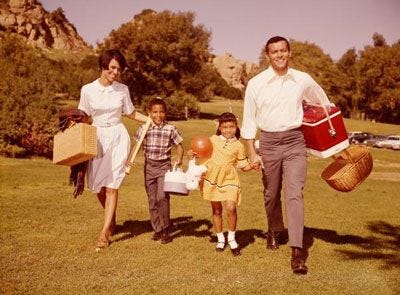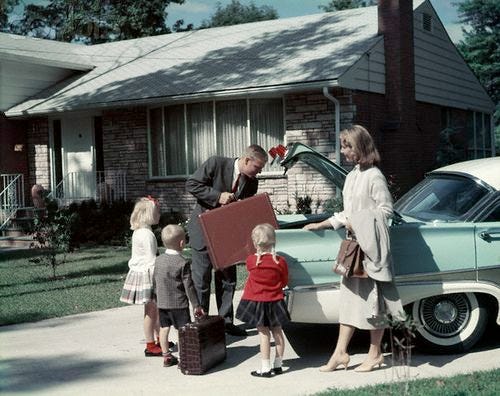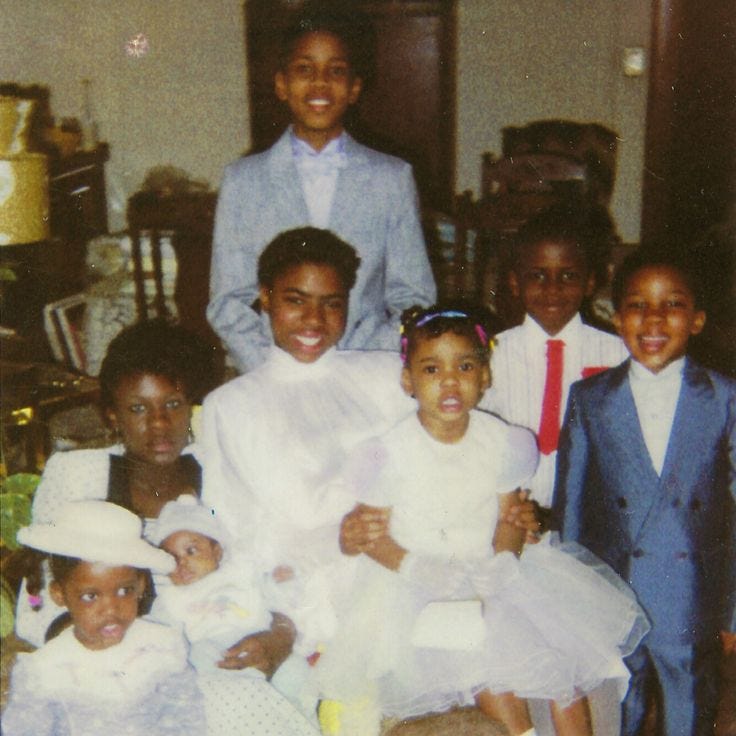Write & Lift is an ethos of personal and spiritual development through conscious physical exertion and practice of the writing craft. Through this effort to strengthen our bodies and minds, we become anti-fragile and self-respecting sovereign individuals. Through this effort, we may stand against untruth and evil and create a new culture of vitality, strength, and virtue.
If this is your first time reading, subscribe here.
“We Did It At Your Age!?”
I will attempt to organize my thoughts around a number of arguments as to why young people generally feel that they aren’t prepared to have children.
The importance of solving this problem, cannot be overstated. A society that stops having children dies or is conquered. If our current birthrate of 1.6 is sustained, the native-born American population will be cut in half in three generations. Our economy will struggle to grow and adapt and the dwindling numbers of young people will be tasked with providing and caring for a disproportionately high number of elderly.
In my estimation, this is the most important long-term problem we need to solve.
Nations and cultures die when native-born citizens aren’t having children.
From my observation, neither “side” has offered any tangible solutions to this problem. To start, both the right and left don’t seem to be listening to hardworking and well-adjusted 23-35 year old couples, when they say “I want kids but it’s hard right now”.
In the United States, we’ve mismanaged and failed to adapt an incentive structure that aligns with the cultural and economic shift of the last two decades. And we’re losing time.
In conversations that I’ve had, four common threads emerge among the “I badly want to have kids but can’t yet” crowd:
The cost of living is unmanageably high and I am burdened with debt
I haven’t found someone I’d want to start a family with yet
I have not started a “career” yet
I do not have any family that lives locally
Do these sound like valid reasons? Or do these sound like excuses from someone who would rather go out to eat every day and play video games for seven uninterrupted hours?
It is obvious that there is a growing contingent of young people who have been conditioned to think that the idea of becoming a parent is immoral. Maybe they suffered through an abusive childhood. Maybe they have an irrational fear of “Trump” or climate change? Maybe, in their own words, they’re just selfish and would rather focus their time elsewhere. Whatever it may be, I’m not particularly interested in talking about those people.
While the left fear-mongers about the social impact of children (like this April headline from CNN: “Should we reconsider having children due to fears about the climate crisis?”) voices on the right are often too flippant to disregard the rational concerns many young people have about starting families. This latter group needs to be heard and fought for. However, they’re often met with condescending remarks:
“If you don’t have enough money to support a family, just get a better job.”
“I had three siblings and we all lived in a small three-bedroom house.”
“By the time I was your age, I’d already had two kids. What are you waiting for?
Even though the right has positioned itself as the “family first” coalition, they make two common mistakes when advocating or encouraging young people to start families.
One: Those who are older, are largely ignorant of the economic strains young people face.
Two: The right lacks the cultural and political willpower to mend the institutions that inflict the most damage on young people seeking upward mobility.
As a necessary caveat, young people who genuinely want to start families have a responsibility to themselves to organize and structure their lives in such a way that allows them to do so. This means being in a loving and committed relationship, maintaining good relationships with friends and family, pursuing a career you are passionate about and that allows you to earn a good living, and having a moral grounding in a specific belief system.
The individual is half of the equation. But this doesn’t discount other, very real, factors that hinder those with even the best intentions from becoming parents.
It is not “cope” to point out the obvious. Compared to their parents and grandparents, the Millennial and Gen Z generations face an uphill climb toward financial independence.
Except in specific fields, a College education no longer guarantees job placement, and the average cost of tuition (adjusted for inflation) has risen from $7k in 1971 to over $38k in 2023. To make between $80k-$120k a year, most young professionals are looking at 4 years of undergraduate study, followed by 2-3 years of postgraduate study and internships.
While trade jobs are often touted as the sensible alternative to a degree, many opportunities are diminished by massive influxes of migrant labor. That’s not to say you can’t get your foot in the door learning a trade, but it’s not the one-size fit solution that it’s made out to be. The Pareto Principle applies here as it does everywhere else. For every HVAC technician making $120k a year, the remaining 90% is making $40k-$50k. Even in states with low costs of living, this income would be difficult to support a family on.
Despite wanting children, many young couples are trapped in a perpetual state of treading financial water.
Let’s assume that a 24-year-old couple doesn’t have college debt, credit card debt, or a car payment (all things one should avoid at a young age). Assuming that they aren’t living in the middle of nowhere in South Dakota, they will still be spending upwards of $15k/yr on rent on top of groceries, bills, gas, car repairs, insurance, and more. Assuming they desire to buy a home in a pleasant, low-crime community with ample job opportunities, they’re looking at an average price of $450k and an average first-time home buyer interest rate of 6.5%.
Remember, this is not a reflection of the average 24-year-old’s financial situation—it’s much worse. Part of this is due to a lack of financial education from parents and institutions. Millions of young people have been told they have to go to college to “get a job” or that they should buy a car so that they can “establish credit”. Millions of young people, desperate to find the American dream, have moved hundreds of miles away from friends and family for school, work, or lower housing prices, severing the familial network that makes starting a family that much easier.
To make having kids attractive to young people, we need to stop putting band-aids on bleeding arteries. We have to place the family at the top of our pyramid of importance.
On a national scale, this means demanding accountability and change from elected leaders and being honest about what isn’t working. And as a new parent who wants to have more children, I’ve seen just how backward the current system is.
While we receive a child tax credit, it does little to hedge against the rising cost of goods, services, and utilities.
In California, my tax dollars provide free Medi-Cal health insurance to non-citizens.
Before the cost of building, the permits and fees for adding a 300 sq ft accessory dwelling unit (ADU) on our property would total over $20k.
While our family is blessed that my wife can stay home with our daughter, the average cost of childcare in California is $1200/mo.
For many young people, monthly bills are paid through multiple part time jobs and gig work. Those who are enterprising and motivated will likely spend the remaining hours of their day building a business or side hustle or getting additional job training.
Compared to previous generations, Gen Z and Millennials have less time and less money to leverage towards climbing the economic ladder. The average age for new fathers is 30 years old and the average age for new mothers is 27. Sixty years ago, a majority of first time parents had their children between 20 and 24.
As long as buying an affordable home remains a fringe possibility, birth rates are going to stagnate. As long as a majority of “careers” require expensive post-graduate degrees and years of low-paid corporate climbing, birth rates are going to stagnate. As long as young people are priced out of their hometowns and forced to move away from family, birth rates are going to stagnate.
To solve this problem, we need large scale institutional and political change that allows young people to step up into their role as parents much more easily.
As always, thanks for reading.
-Joe










Look at the gap between boomers and millennials.
Where did the money go? It didn’t disappear. But it is not in the hands of the younger generations.
Where is it?
It was siphoned off by bankers, with the permission of the politicians they bought with it.
The system will not change, no matter who you vote for.
Assassins will be hired, before the people with that money, will let go of it.